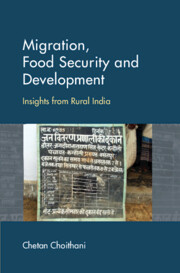
-
Select format
-
- Publisher:
- Cambridge University Press
- Publication date:
- 22 February 2023
- 11 May 2023
- ISBN:
- 9781108885799
- 9781108840378
- Dimensions:
- (228 x 152 mm)
- Weight & Pages:
- 0.58kg, 358 Pages
- Dimensions:
- Weight & Pages:
- Subjects:
- Economics, Macroeconomics, Economic Development and Growth
You may already have access via personal or institutional login- Subjects:
- Economics, Macroeconomics, Economic Development and Growth
Book description
This book examines the role of migration as a livelihood strategy in influencing food access among rural households. Migration forms a key component of livelihoods for an increasing number of rural households in many developing countries. Importantly, there is now a growing consensus among academics and policymakers on the potential positive effects of migration in promoting human development. Concurrently, the significance of food security as an important development objective has grown tremendously, and the Sustainable Development Goals agenda envisages eliminating all forms of malnutrition. However, the academic and policy discussions on these two issues have largely proceeded in silos, with little attention devoted to the relationship they bear with each other. Using the conceptual frameworks of 'entitlements' and 'sustainable livelihoods', this book seeks to fill this gap in the context of India - a country with the most food-insecure people in the world and where migration is integral to rural livelihoods.
Contents
Metrics
Altmetric attention score
Full text views
Full text views help Loading metrics...
Loading metrics...
* Views captured on Cambridge Core between #date#. This data will be updated every 24 hours.
Usage data cannot currently be displayed.
Accessibility standard: Unknown
Why this information is here
This section outlines the accessibility features of this content - including support for screen readers, full keyboard navigation and high-contrast display options. This may not be relevant for you.
Accessibility Information
Accessibility compliance for the HTML of this book is currently unknown and may be updated in the future.


